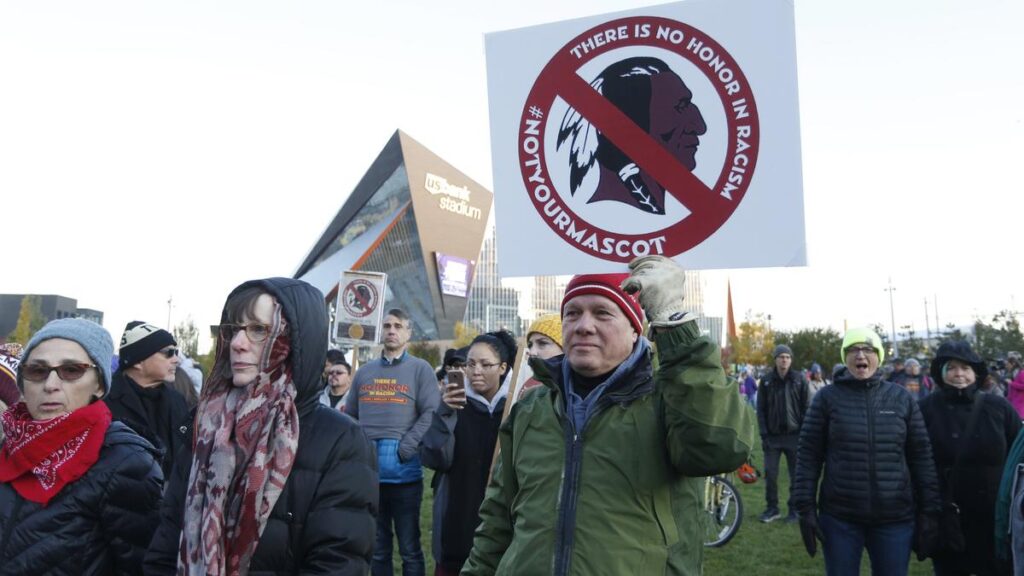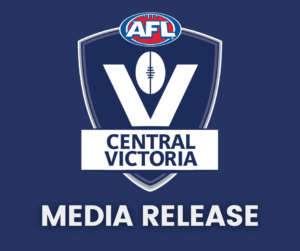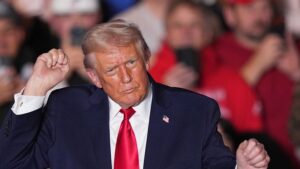
FILE - In this Oct. 24, 2019, file photo, Native American leaders protest against the Redskins team name outside U.S. Bank Stadium before an NFL football game between the Minnesota Vikings and the Washington Redskins in Minneapolis. A new name must still be selected for the Washington Redskins football team, one of the oldest and most storied teams in the National Football League, and it was unclear how soon that will happen. But for now, arguably the most polarizing name in North American professional sports is gone at a time of reckoning over racial injustice, iconography and racism in the U.S. (AP Photo/Bruce Kluckhohn, File)
US President Donald Trump has called for the Washington Commanders NFL franchise and Cleveland Guardians MLB team to revert to their previous names, stirring debate over the implications of such a change. The Commanders, formerly known as the Washington Redskins, and the Guardians, previously the Cleveland Indians, adopted their current names during the 2022 season after years of controversy surrounding their former identities.
In a post on his social media platform, Truth Social, Trump expressed that the Commanders should “IMMEDIATELY change their name back to the Washington Redskins Football Team.” He cited a perceived demand for the name change, stating, “There is a big clamouring for this.” He further commented on the Guardians, claiming that “Our great Indian people, in massive numbers, want this to happen,” suggesting that their heritage is at stake.
Historical Context of the Name Changes
The transition from Redskins to Commanders followed significant pressure over the use of a name deemed offensive to Indigenous peoples. The franchise dropped the Redskins name after the 2019 season and spent two years as the Washington Football Team before rebranding in 2022.
Similarly, the Cleveland baseball team announced in December 2020 that it would retire the Indians name, ultimately adopting the Guardians moniker in July 2021. The decision was also part of a broader national conversation about racial sensitivity in sports, which included the removal of the controversial Chief Wahoo logo in 2018.
Trump’s comments have reignited discussions about identity and representation in sports. He argued that “Times are different now than they were three or four years ago. We are a Country of passion and common sense. OWNERS, GET IT DONE!!!” His statements reflect a growing divide in public opinion regarding the appropriateness of team names and mascots.
Responses from Team Leadership
Josh Harris, who purchased the Commanders from former owner Dan Snyder in 2023, has publicly stated that the current name is here to stay. He dismissed speculation about reverting to the Redskins, affirming the team’s commitment to its new identity. “We’re excited about what we can build as the Commanders,” Harris remarked.
Meanwhile, Chris Antonetti, president of baseball operations for the Guardians, indicated that there are no plans to reconsider the name change. Prior to a recent game against the Athletics, Antonetti acknowledged that while perspectives on the decision vary, the team is enthusiastic about its future as the Guardians.
Trump also hinted at potential repercussions, stating that he would consider blocking the Commanders from developing a new stadium in Washington should they refuse to change the name back. This statement raises questions about the intersection of politics and sports, particularly regarding public funding for stadiums.
Both teams have rich histories within their respective leagues. The Commanders, originally founded as the Redskins in 1933 in Boston, moved to Washington, D.C., four years later. The Guardians, on the other hand, trace their lineage back to 1901 when they joined the American League as the Blues, evolving through several names before settling on Indians in 1915.
Interestingly, both franchises share ownership ties through David Blitzer, who is part of Harris’ ownership group with the Commanders while holding a minority stake in the Guardians. This connection further intertwines the narratives of these two teams as they navigate their identities amidst changing societal norms.
The ongoing debate surrounding team names highlights the complexities of cultural representation in sports, a discussion that continues to evolve as societal values shift. As the Commanders and Guardians move forward, the impact of these names on both fan engagement and community sentiment remains a critical consideration.







